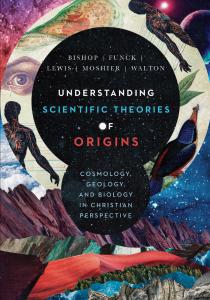 This last week I received a new book from IVP Academic: Understanding Scientific Theories of Origins. This book is the joint effort of five Wheaton professors and grew out of a course they’ve been team teaching for two decades or so (along with a handful of other colleagues). Their collected expertise ranges from Physics to Old Testament. Robert Bishop is professor of physics and philosophy, Larry Funck is a chemist (now retired), Raymond Lewis is a biologist, Stephen Moshier a geologist, and John Walton, an Old Testament specialist. They have the necessary background and training to deal with the scientific and biblical issues involved in questions of origins along with a strong faith and commitment to orthodox biblical Christianity.
This last week I received a new book from IVP Academic: Understanding Scientific Theories of Origins. This book is the joint effort of five Wheaton professors and grew out of a course they’ve been team teaching for two decades or so (along with a handful of other colleagues). Their collected expertise ranges from Physics to Old Testament. Robert Bishop is professor of physics and philosophy, Larry Funck is a chemist (now retired), Raymond Lewis is a biologist, Stephen Moshier a geologist, and John Walton, an Old Testament specialist. They have the necessary background and training to deal with the scientific and biblical issues involved in questions of origins along with a strong faith and commitment to orthodox biblical Christianity.
This is a textbook – it is large, long (630 pages from introduction to postscript), well illustrated, and well written. It is a book, however, that should be of interest to anyone who wants to delve into the issues. From the introduction:
This is a book about mainstream scientific theories of origins in astronomy and cosmology (origins of the universe), chemistry (origin of life), geology (origin of the Earth and solar system), biology (origin of species), and physical anthropology and genetics (human origins), But it is more than a book about these theories and the evidences and inferences supporting them. It is also a book about biblical and theological perspectives on the science of origins. We believe that the Bible is the authoritative Word of God for faith and practice as believers. As God’s inspired revelation, even though it was written in historical and cultural contexts very different from ours, the Bible gives us insight for how to understand and engage these scientific theories. (p. 1)
The book does not present “Christian alternatives” to mainstream science, but looks at the mainstream science carefully and accurately. The book is not written for scientists and science majors, but aimed a general lay audience. The material has been shaped and refined through many offerings of the course for non-science majors. Because this is a book for Christians, it starts with biblical interpretation and repeatedly returns to the implications for our faith.
We can’t all attend Wheaton to sit in the classroom, participate in discussions, and question the professors, but we can benefit from their experience and expertise. Although a detailed look at the scientific content of this book is beyond the scope of any blog, including this one, over the next couple of months we will look at a the biblical and theological perspectives on the origin of the universe, the earth, and life.
If you wish to contact me directly you may do so at rjs4mail [at] att.net.
If interested you can subscribe to a full text feed of my posts at Musings on Science and Theology.
An outline of the contents:
Part One: Getting Started on the Journey
1. Principles and Methods of Biblical Interpretation
2. A Comprehensive Doctrine of Creation and Implications for Scientific Study
3. Knowledge and Faith in Pursuing Origins Questions
4. Creation Through the Lenses of Science and Theology
Part Two: Cosmic Origins
5. Cosmic Origins: Genesis 1:1–2:4
6. Electromagnetic Radiation and the Scale of the Universe
7. The Expanding Universe
8. The Big Bang Model and Contemporary Cosmology
9. Lives and Deaths of Stars and Fine-Tuning
10. Biblical and Theological Perspectives on the Origins of the Universe
Part Three: Origin and Geologic History of Earth
11. Origin of the Earth and Solar System
12. Historical Roots of Geology: Catastrophism and Uniformitarianism
13. The Genesis Flood
14. The Rock Cycle and Timescales of Geologic Processes
15. Rocks of Ages: Measuring Geologic Time
16. Plate Tectonics: A Theory for How the Earth Works
17. Reading Earth’s History in Rocks and Fossils
18. Biblical and Theological Perspectives on Earth History
Part Four: Origin of Life on Earth
19. From Spontaneous Generation to Abiogenesis
20. Prebiotic Chemistry: Preparing the Primordial Soup
21. Biological Information: Proteins and Nucleic Acids
22. Alternative Scenarios for Life’s Origin
23. Biblical and Theological Perspectives on the Origin of Life
Part Five: Origin of Species and Diversity of Life
24. Development of the Theory of Evolution
25. The Modern Synthesis of Evolution
26. Exploring the Evidence about Evolution: Phylogeny and Fossils
27. Development of an Extended Synthesis of Evolution
28. Biblical and Theological Perspectives on the Origin of the Diversity of Life
Part Six: Human Origins
29. Human Origins: Genesis 2–3
30. Human Origins: Evidence from Physical Anthropology
31. Human Origins: Genomic Evidence
32. Biblical and Theological Perspectives on the Image of God
Part Seven: Concluding Postscript
33. Biblical and Theological Perspectives on New Creation, Creation Care, and Science Education















